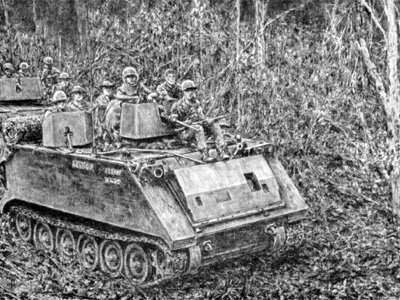
President Barack Obama today gave the Presidential Unit Citation, which has only been awarded about 100 times since World War II, to Alpha Troop, 1st Squadron, 11th Armored Cavalry, the legendary Blackhorse Regiment in Vietnam.
It was March 1970, deep in the jungles of Vietnam. And through the static and crackle of their radios Alpha Troop heard that another unit was in trouble. Charlie Company, from the 1st Calvary Division, had stumbled upon a massive underground bunker of North Vietnamese troops. A hundred Americans were facing some 400 enemy fighters. Outnumbered and outgunned, Charlie Company was at risk of being overrun.
That’s when Alpha Troop’s captain gave the order: “Saddle up and move out.”
As these men will tell you themselves, this isn’t the story of a battle that changed the course of a war. It never had a name, like Tet or Hue or Khe Sanh. It never made the papers back home. But like countless battles, known and unknown, it is a proud chapter in the story of the American soldier.
Obama delivered a stirring account of what Alpha Troop went through to rescue Charlie Company, using tanks to plow through the jungle and into the arms of a North Vietnamese battallion. But the account was nowhere near as stirring as Alpha Company’s commander, John Poindexter, gave during a leadership seminar the Army held almost 10 years ago.
At this late hour, saddled with the Charlie Company injured, we could follow only one course of action: an assault directly into the center of the enemy bunker complex. There was no daylight remaining for a careful probe around the exterior of the enemy configuration for the weak element. No time to execute an attack on more than one axis and, without our sister units from the 1st Squadron, no opportunity to envelop the NVA battalion and eradicate it entirely. Just a brutal, unoriginal shot straight ahead, which the enemy commander would expect. And we probably were outnumbered two to one.
Why the honor now? Almost 40 years later? According to the Washington Post, Poindexter, now a Houston businessman, realized many of his men had gone unrecognized. He filed the required documents for today’s award. (Listen to an interview with Poindexter via the New York Times)
